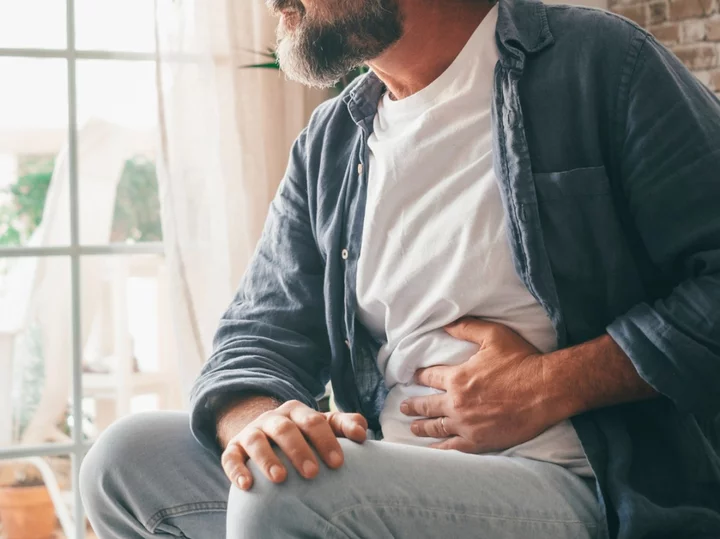
What is silent reflux?
The tendency to stuff your face with food is often met with the urgent need to settle your stomach by laying on the couch for hours, especially during the holiday season. However, what some people fail to realise is that sprawling out after a big meal may not soothe your body like you think. Silent reflux, often referred to as laryngopharyngeal reflux (LPR), can potentially be caused by “overeating and lying down just after eating”, according to the UT Southwestern Medical Centre. With Thanksgiving fast approaching, it’s important to be aware of the symptoms and signs of LPR, ensuring you aren’t inadvertently subjecting your body to the condition. UT Southwestern Medical Centre defines LPR as “a condition in which stomach acid flows back up the esophagus [swallowing tube] into the larynx [voice box] and throat.” The name is derived from the inherent form of the condition, which doesn’t cause any symptoms in the chest. When you swallow food, the contents travel down the esophagus past two sphincters, a ring-shaped muscle on the lower and upper portions of the esophagus connected to the stomach. Before the gastrointestinal system digests the food, the sphincters close so the contents aren’t able to come back up the esophagus. “If the sphincter does not close properly, acidic stomach contents can flow back into the esophagus, up to the throat and larynx,” the medical centre states. Potential causes of LPR include alcohol use, tobacco use, “certain food choices” like spicy or fried foods, obesity, overeating habits, clothing that fits tightly around the abdomen, and lying down immediately after food consumption. While the condition doesn’t evoke chest-burning symptoms like other forms of acid reflux, there are a number of other symptoms associated with LPR. Asthma, hoarseness, postnasal drip, lump sensation in the throat, bitter taste in the throat, difficulty swallowing, sore throat sensation, and burning throat sensation are all symptoms of silent reflux. “LPR can be the underlying cause of hoarseness, laryngitis, chronic throat clearing and related symptoms. You might not have typical acid reflux symptoms, like heartburn or indigestion,” the Cleveland Clinic explains. “Symptoms of acid reflux usually affect your lower esophagus, within your chest. But if you have LPR, the reflux has a habit of creeping higher up, into your larynx (voice box) and pharynx [throat].” Certain foods and beverages can cause a breach in the lower esophageal sphincter; coffee, chocolate, mint, garlic, and onions all have the potential to cause LPR. Since there is no single cause of LPR, treatments include lifestyle and diet adjustments. “Some people can solve their LPR with lifestyle adjustments alone,” Cleaveland Clinic suggests. “It takes time for LPR to heal, though, so it may be several months before you can tell if your adjustments are working.” Medications called proton pump inhibitors are also offered to help move the healing process along. Surgery is only necessary in severe cases such as “an obvious defect affecting your esophageal sphincter muscles, like a hiatal hernia,” the Cleveland Clinic states. Read More Shingles symptoms, what causes it and how to treat the virus 13 possible cancer symptoms you should get checked out Salon owner with incurable cancer who lost hair in treatment makes customisable wigs
2023-11-09 04:29
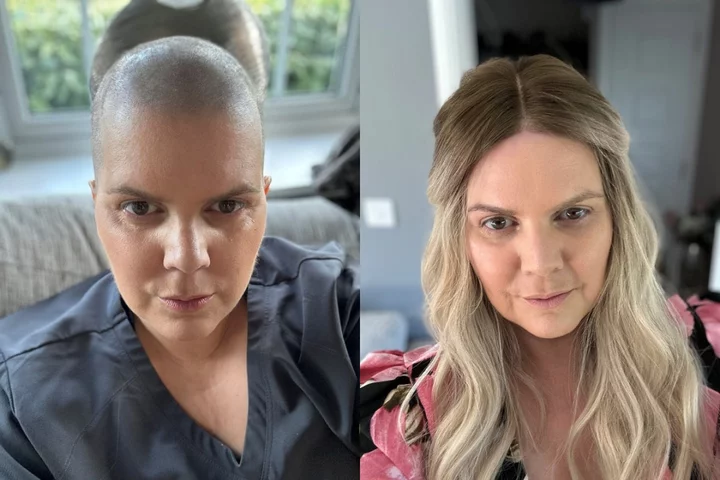
Salon owner with incurable cancer who lost hair during treatment makes customisable wigs to help others feel ‘confident’
A salon owner with incurable cervical cancer who lost her hair while having chemotherapy has said wearing wigs has given her “reassurance in a world where nothing is certain”, and she now sells handmade, customisable bespoke wigs to help others feel “confident” in their own skin. Amanda Humphrey, 43, who owns Saramanda1 hair salon in Great Denham, Bedfordshire, was diagnosed with cervical cancer in October 2017 after delaying her smear test by seven years. She underwent a radical hysterectomy in December that year – a surgical procedure to remove the womb and surrounding tissues – and was in remission weeks later. The cancer returned and Humphrey received her second cervical cancer diagnosis just two days before Christmas in 2021, and she then started chemotherapy and radiotherapy. She described this as “hell on Earth”, and within two weeks of starting chemotherapy the second time, she noticed her hair was being “blown out of [her] head” by the wind. Humphrey shaved her head and embraced her baldness but soon realised she missed having “that comfort blanket” – and she then searched “high and low” for a realistic, non-synthetic wig. Through her own searches, which were often fruitless, she realised that the number of people selling customisable wigs made of human hair in her area were few and far between. This led to Humphrey making and selling her own – and now, despite her uncertain prognosis, she said her mission is helping people struggling with hair loss feel like themselves again. “My message is I get it, and that’s why I love the wigs that we produce,” Humphrey told PA Real Life. “I’m proud of the wigs that we produce, and I’m so grateful that people choose us to be a part of their journey. “Every wig is made with love and strength, they are made from the heart, and me and my entire team, we all want them to be just perfect.” Cervical cancer is a cancer that is found anywhere in the cervix – the opening between the vagina and the womb. Symptoms include unusual vaginal bleeding, changes to vaginal discharge, pain during sex or pain in your lower back, the NHS says. Humphrey, who was working as a detective in London at the time and had only just opened her salon, said she had no symptoms prior to her diagnosis and “always found an excuse to cancel [her] smear test”. It was only when a colleague strongly encouraged her to book her smear test, seven years after she was first invited to have one, that she received her diagnosis in October 2017. She said she holds herself responsible for this and has since campaigned for other women to book their smear tests without delay by sharing the message “Don’t be me”. Speaking about her first diagnosis, she said: “I walked into the room and I looked at the consultant and, before I’d even sat down, I said ‘Have I got cancer?’ And he said ‘Yes’. “Then I said ‘Am I going to die?’ And he said, ‘I need to examine you and then I can tell you.’” Humphrey explained that telling her son, who she wishes to keep anonymous, was the hardest part, and she later underwent a radical hysterectomy, which was performed via keyhole surgery. A biopsy revealed she was in remission just weeks later, and while this was positive news she felt “lost” afterwards. She did not process the “trauma” of the cancer and the fact she could no longer get pregnant due to the radical hysterectomy until much later. “Emotionally I struggled because although I didn’t necessarily want more children, I wasn’t ready to to lose that option,” Humphrey explained. “I grieved not having more children, I grieved something I didn’t have, and I never sought help on that, ever. “Given it’s a gynaecological cancer as well, when I visit my local hospital for any appointment, I sit in a room with pregnant people waiting for their appointments. “They come out of their appointments happy, with their files and scan photos, and you’re sitting there, thinking ‘I can’t have that any more’.” In the years that followed, after Humphrey was medically retired from the police, she continued with cervical cancer awareness campaigns and focused on her salon. However, she started to experience agonising pain in her left leg in 2021 and could not pinpoint the exact source of it. After undergoing scans and tests, she was diagnosed with cervical cancer recurrence just two days before Christmas that year. She then underwent chemotherapy and radiotherapy, which caused her to experience sickness, muscle aches, nose bleeds and ulcers in her mouth. During her second round of chemotherapy she lost her hair within two weeks. “I remember saying to one of the nurses ‘The next time I see you in three weeks, will I have hair?’ And she just said ‘No’, and it was true,” Humphrey said. “I was stood outside my salon on week two and it was really windy and I was trying to make a phone call outside. “I said to my colleague ‘My hair is being blown out of my head’ – it was literally just floating past us – so we shaved it off.” Humphrey said she embraced being “bald and proud” initially, but she missed the “comfort” that having hair gave her – and so her journey to creating her own human hair wigs began. Each wig starts from approximately £450, depending on the length and thickness, and can take up to three weeks to make as Humphrey and her team at the salon custom-colour each one. Humphrey said she will often “work into the night” to finish an order, if required, and some customers have even cried when seeing the finished product. She has since partnered with Jo’s Cervical Cancer Trust as well, and for every wig sold through the charity she will donate 10 per cent of the proceeds to the organisation. She explained: “Wearing wigs has given me so much reassurance in a world where nothing is certain. “Just having a wig on gives me that comfort and ability to just be normal, and I want to help others achieve that feeling.” In October 2022, Humphrey was informed her cancer is incurable and she will most likely not reach remission again – however she is determined to keep fighting. She is now having pembrolizumab – a type of immunotherapy – and has regular check-ups, and although she was told that statistically she may only have 18 months to live, she said she wants to “prove everyone wrong, even if (she dies) trying”, and she will not stop her “passion” of making wigs for others. “The results we get are amazing, they’re happy, and being able to support someone with part of their journey is so rewarding – it’s always something I’ve wanted to do,” she said. “It helps them feel confident, and the comfort comes in, but it’s just the fact they can walk out their front door feeling normal.” She added: “If my journey can help someone in the future, then I’m all in.” To find out more about Humphrey and the wigs she and her team make, search @saramanda1_wigs on Instagram. For more information and support about cervical cancer, visit Jo’s Cervical Cancer Trust’s website here. Read More Witch achieves ‘heightened sense of fulfilment’ after self-marriage ceremony If being without your phone fills you with dread, you could have nomophobia Nursery places and wraparound childcare plans announced Is scalp exfoliation the key to healthier hair? Why do some people love horror movies? TikTok influencers warn about ‘potent’ steroid cream risks among black women – dermatologist explains the risks
2023-11-08 17:26
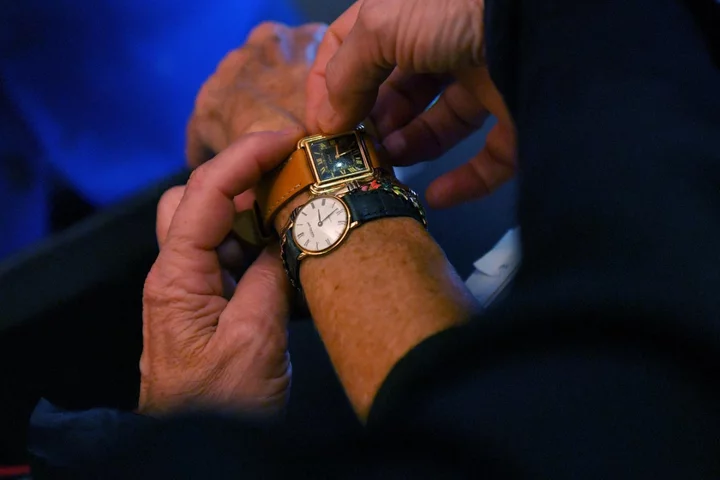
Should we end daylight saving time? Doctors think it’s bad for our health
Doctors have called for the elimination of daylight saving time citing potential harm that may result from the practice. Daylight saving time is a practice of setting the clock forward by an hour beginning on the second Sunday in March in order to use light from the sun for longer. Once winter arrives, clocks are then set backwards an hour, ending the practice around the first Sunday of November, so people can get an extra hour of sleep. Doctors from the American Academy of Sleep Medicine (AASM) called for an end to the practice, citing potential harms that can result due to changes to and from daylight saving time. Instead, they are in favour of setting standard time, which is the time when the clocks are set back in the fall, permanently. Doctors say such a permanent standard time aligns best with the human body’s natural inner clock. “By causing the human body clock to be misaligned with the natural environment, daylight saving time increases risks to our physical health, mental well-being, and public safety. Permanent standard time is the optimal choice for health and safety,” Adeel Rishi, chair of the AASM Public Safety Committee, said in a statement. AASM had previously shown in a study in 2020 that Daylight Saving Time (DST) is linked to “increased risks of motor vehicle accidents, cardiovascular events, and mood disturbances” as people annually “spring forward” to adopt the practice. Previous research has also found that pushing the clock back an hour can impact mental health. An analysis of data from more than 185,000 Danish people found an over 10 per cent rise in depressive episodes during the shift from summer time to standard time. The position to end DST is also supported by previous statements adopted by organisations such as National Sleep Foundation and the American Medical Association. “Permanent standard time helps synchronize the body clock with the rising and setting of the sun. This natural synchrony is optimal for healthy sleep, and sleep is essential for health, mood, performance, and safety,” James A Rowley, president of the AASM, said. However, the US Senate has passed The Sunshine Protection Act in March 2022, which would make US daylight saving time permanent. But this bill still requires approval by the House and president Joe Biden to be coded into law. Read More Here’s what a sleep expert says about the time change as clocks change in US Daylight saving time 2023: When do the clocks go back in the US? This is what changing the clocks can do to your health Mother of newborn triplets shares how they react differently after eating Stephen Fry uses walking stick after breaking his leg, pelvis and ‘a bunch of ribs’ Mother’s song about how easy it is to be ‘such a good dad’ goes viral
2023-11-08 06:55
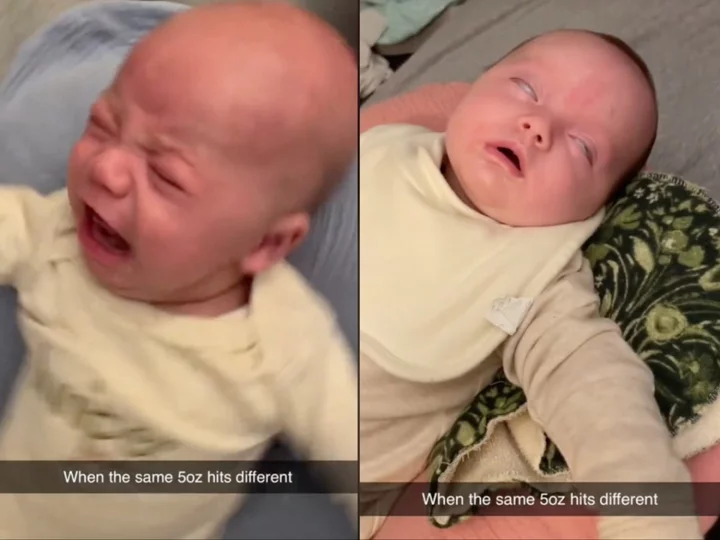
Mother of newborn triplets shares how they react differently after eating
While they might not be easy to tell apart, one mother has captured how differently her three children react after being given the same five ounces of milk. Jocelyn, who goes by the username @lesbi_honest_20 on TikTok, took to the platform to share a video of her triplets - daughters Willow and Eden, and son Juniper - along with the on-screen text: “When the same 5oz hits different.” She then filmed her children one by one, as Juniper was seen crying from still being hungry. Eden was relaxed with her bib on after having a full meal, while Willow managed to fall asleep with her eyes rolled back. “Took this while we waited for more milk to heat up for our hungry Juni boy!” Jocelyn captioned the TikTok. “It’s crazy how much they are growing into three unique individuals. I love learning more about them every day.” Since it was first posted on 19 October, the video has gained more than 11m views, with many people joking about how the triplets are a total representation of their moods. “The three stages of milk drunk,” one commenter joked. “We got the crier, the ‘I might be drunk’, and the one you have to carry home every time.” “Different reviews same restaurant,” another user joked. Some commenters mentioned how much Eden’s sleeping reaction made them laugh, with one commenter writing: “I wasn’t expecting the second one, so I was really surprised by the third.” @lesbihonest_20 Took this while we waited for more milk to heat up for our hungry Juni boy! Its crazy how much they are growing into 3 unique individuals. I love learning more about them ever day. #tripletsoftiktok #tripletmom #newbornbabies #fyp #triplets #tripletlife ♬ original sound - Lesbi_Honest_20 Another commenter agreed, adding: “Omg the third one just transcended.” In an interview with Today, Jocelyn revealed that her triplets’ reactions weren’t that uncommon compared what she’s witnessed before. “Juni is our biggest eater. He can eat and eat and eat. My wife was in the kitchen heating another bottle for him when I started recording,” she told the outlet. Jocelyn explained that the best way to describe baby Eden was exactly like how she acted in the TikTok: “Happy-go-lucky.” As for why baby Willow ended up falling asleep, the mother said it was because of how small she is compared to her siblings. “She’s our little peanut,” Jocelyn called Willow. “Five ounces for her is a lot.” However, she noted that Willow makes up for her small size with her outlandish personality, especially because she’s the oldest. “Willow came out first. She’s been giving side eye since the day she was born, and has to know what is going on with everyone. She’s our nosey Nancy,” Jocelyn told Today. “The NICU nurses used to joke that Willow was judging them!” The triplets’ differences don’t stop with their eating habits either, as Jocelyn mentioned that the babies vary with their sleeping habits too. She explained that Willow is her morning person, Eden is her night person, and Juniper isn’t either and is “somewhere in the middle.” “Eden is up until 2am and then she’s grumpy when she wakes up and won’t even look at you until after 11,” Jocelyn said. “It’s actually kind of funny. That girl is not a morning person.” The Independent has reached out to Jocelyn for comment. Read More Maria Menounos felt like she was ‘going to explode inside’ due to pancreatic cancer Robert De Niro’s family: What to know about his seven children Mom explains how to raise your first baby like it’s your third Maria Menounos felt like she was ‘going to explode inside’ due to pancreatic cancer Robert De Niro’s family: What to know about his seven children Mom explains how to raise your first baby like it’s your third
2023-11-02 05:57
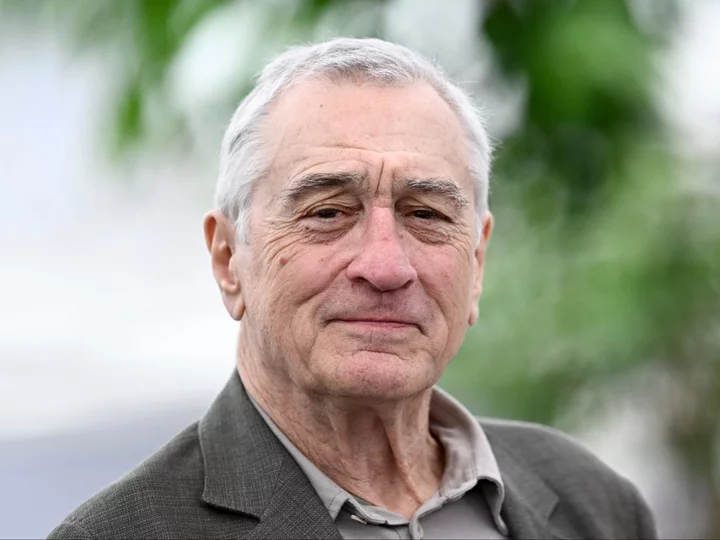
Robert De Niro’s family: What to know about his seven children and their mothers
Not only is Robert De Niro one of Hollywood’s most famous actors, but he’s also a father to seven children. The Killers of the Flower Moon star, 80, is currently facing a $12m lawsuit over accusations of “severe emotional distress and reputational harm” brought against him by his former assistant, Graham Chase Robinson. During a heated trial in New York federal court, De Niro admitted to “berating” Robinson and calling her a “f***ing spoiled brat”, before shouting “shame on you” at her inside the courtroom. Robinson worked as De Niro’s vice president of production and finance between 2008 and 2019, before she quit over reported clashes with his girlfriend, Tiffany Chen. The Taxi Driver star recently became a father of seven when he and Chen welcomed their daughter, Gia Virginia Chen-De Niro, in April. De Niro revealed the baby news in an interview with ET Canada, when he corrected a reporter who said he had six children. “Seven, actually,” he said. “I just had a baby.” Speaking to Page Six, De Niro maintained that the pregnancy was planned. “How could you not plan that kind of thing?” he said. As the $12m lawsuit filed by his former assistant puts De Niro’s personal life in the spotlight, much attention has been focused on his extensive family tree. Here’s what to know about De Niro’s seven children and their mothers. Drena De Niro In 1976, the Oscar winner married his first wife, Diahnne Abbott, after they met on the set of director Martin Scorsese’s Taxi Driver. He adopted Abbott’s daughter, Drena, from a previous relationship. Drena was born in 1971, and took the actor’s last name when her mother and step-father were married. She became a model, but later followed in De Niro’s footsteps when she decided to pursue acting. Drena has appeared in several of her father’s films, including Showtime, Wag the Dog, City by the Sea, and The Intern. In 2003, she welcomed her son Leandro De Niro Rodriguez with her then-boyfriend, Carlos Mare. In July 2023, Drena announced that Leandro had died at age 19. She shared a picture of Leandro on Instagram with a caption paying tribute to his life. “My beautiful sweet angel,” she wrote. “I have loved you beyond words or description from the moment I felt you in my belly. You have been my joy, my heart and all that was ever pure and real in my life.” She continued: “I wish I was with you right now. I wish I was with you. I don’t know how to live without you but I’ll try to go on and spread the love and light that you so made me feel in getting to be your mama. “You were so deeply loved and appreciated and I wish that love alone could have saved you,” Drena concluded the post. De Niro later issued a statement saying he was “deeply distressed by the passing of my beloved grandson Leo”. “We’re greatly appreciative of the condolences from everyone. We ask that we please be given privacy to grieve our loss of Leo,” the statement continued. The New York City chief medical examiner’s office confirmed one month later that Leandro had died of an accidental drug overdose. Raphael De Niro Raphael is the second child of De Niro and Abbott. He was born on 9 November 1976, the same year his parents tied the knot. He strayed away from the family business and decided to pursue a career in real estate. According to his website, he is a broker at Douglas Elliman and launched the De Niro Team with the real estate firm in 2004. Some of his celebrity clients include Renee Zellweger and Kelly Ripa. He shares three children with his ex-wife, Claudine De Matos, who he married in 2008. They separated in 2015 and finalised their divorce in January 2020, per Page Six. He went on to marry stylist Hannah Carnes in March 2020. Julian and Aaron De Niro Following his divorce from Abbott in 1988, De Niro went on to date actor Toukie Smith. While the pair were never married, they welcomed twin sons Julian Henry and Aaron Kendrick in 1995. Julian also followed in his father’s footsteps, appearing in the 2016 film In Dubious Battle and portraying a young Barack Obama in the Showtime historical drama series, The First Lady. Elliot De Niro Perhaps De Niro’s longest relationship was with actor Grace Hightower, who he married in 1997. She gave birth to their first child together, a son named Elliot, in 1998. In March 2019, the Silver Linings Playbook star revealed his son had been diagnosed with autism. De Niro and Hightower soon became involved in a legal battle when he filed for divorce in 1999 and sued her for custody of their son in 2001. However, the two reunited and called off their divorce in 2004. The couple renewed their vows in November that year in upstate New York, surrounded by A-list celebrities like Martin Scorsese, Meryl Streep, and Ben Stiller. Helen Grace De Niro In December 2011, the former couple welcomed their second child, daughter Helen, via surrogate. De Niro and Hightower separated in November 2018 after more than 20 years together. Gia Virginia Chen-De Niro De Niro became a father of seven when he and girlfriend Tiffany Chen welcomed daughter Gia Virginia on 6 April 2023. In an interview with Gayle King for CBS Mornings, Chen revealed that she was diagnosed with Bell’s palsy after giving birth to their daughter. Bell’s palsy is a neurological disorder that temporarily paralyses one side of the face, causing it to appear droopy and lopsided. Speaking to The Guardian in October, De Niro revealed that Chen does most of the “heavy lifting” when raising their six-month-old daughter. When asked if fatherhood ever “gets easier” after being a parent for quite some time, De Niro admitted that it doesn’t but praised his partner for her support. “It doesn’t get easier,” he said. “It is what it is. It’s okay. I mean, I don’t do the heavy lifting. I’m there, I support my girlfriend. But she does the work. And we have help, which is so important.” De Niro also explained how his relationships with his older children are different from his younger children. “With a baby, it’s different to with my 11-year-old. My adult children. My grandchildren. It’s all different,” he said. “I don’t talk to the adult children the way I talk to my baby, or the way I speak to my 11-year-old, though she’s pretty smart.” Read More Maria Menounos felt like she was ‘going to explode inside’ due to pancreatic cancer Mom explains how to raise your first baby like it’s your third Emilia Clarke feared being fired from Game of Thrones after brain haemorrhage Maria Menounos felt like she was ‘going to explode inside’ due to pancreatic cancer Mom explains how to raise your first baby like it’s your third Emilia Clarke feared being fired from Game of Thrones after brain haemorrhage
2023-11-02 05:26

Maria Menounos felt like she was ‘going to explode inside’ due to ‘severe pain’ from pancreatic cancer
Maria Menounos has admitted that she felt like she was “exploding inside” due to severe pain from pancreatic cancer. Before the TV host was diagnosed with pancreatic cancer in January 2023, she recalled experiencing excruciating pain after she ate a farro salad while on a flight more than one year ago. At the time, she dismissed her alarming symptoms, according to Today. “It was like that kind of pain where you felt like you were going to explode inside,” she explained to the outlet. “I thought it was the farro. I thought that I must be getting really gluten intolerant and my stomach just was not handling this well.” Menuonos, 45, decided to go to the doctor after continuing to experience symptoms - such as bloating, diarrhea, and stomach pain - but despite undergoing an endoscopy and colonoscopy, doctors couldn’t find the source of Menuonos’ problems. Not only that, but a CT scan also indicated that her pancreas and other organs were fine. After the host’s “severe” abdominal pains continued, she elected to get a full-body MRI. The scan revealed that she had a 3.9-centimeter tumour growing on her pancreas, leading to her being diagnosed with stage 2 pancreatic cancer. “That’s why I keep saying to people: If the symptoms persist, so should you,” Menounos said. “You have to be your own advocate and you have to keep pushing. It’s exhausting, but your life really depends on it.” “You’ve got to listen to your bodies,” she added. “For me it’s: ‘Feel something, say something, do something, and keep doing the something until someone tells you what’s happening.’” In honour of the beginning of November’s Pancreatic Cancer Awareness Month, Menounos took her advocacy to the next level by appearing in a public service announcement for the Pancreatic Cancer Action Network (PanCAN). According to the American Cancer Society, more than 62,000 people are diagnosed each year with pancreatic cancer, while more than 49,800 are reportedly estimated to die from the disease in 2023 alone. One year after diagnosis, the survival rate of patients is at a low 20 per cent, and less than 10 per cent will reportedly continue to live five years later. Pancreatic cancer symptoms often don’t reveal themselves until too late. In February of this year, Menuonos spoke to People about her cancer journey. She stressed that people should seek answers about their health issues, in order to catch problems that may turn out to be much more. “I need people to know there are places they can go to catch things early,” she told the outlet at the time. “You can’t let fear get in the way. I had that moment where I thought I was a goner - but I’m OK because I caught this early enough.” Menounos’ experience with pancreatic cancer wasn’t the only time the host had been diagnosed with a tumour. In 2017, she was diagnosed and treated for a benign brain tumour. The former E! News anchor and her husband, Keven Undergaro, welcomed their first child together via surrogate in June, just five months after Menounos’ pancreatic cancer diagnosis. Read More Robert De Niro’s family: What to know about his seven children Mom explains how to raise your first baby like it’s your third Emilia Clarke feared being fired from Game of Thrones after brain haemorrhage Robert De Niro’s family: What to know about his seven children Mom explains how to raise your first baby like it’s your third Emilia Clarke feared being fired from Game of Thrones after brain haemorrhage
2023-11-02 05:18

Emilia Clarke feared being fired from Game of Thrones after brain haemorrhage
Emilia Clarke has revealed she was afraid of being fired from Game of Thrones after she suffered a brain haemorrhage in 2011. Clarke, 36, played “Mother of Dragons” Daenerys Targaryen on the hit HBO adaptation of George R R Martin’s fantasy novel series A Song of Ice and Fire. The British actor revealed she “was struck” by the bleed on the brain after filming the first season of the show, in a 2019 essay for The New Yorker. Clarke described how she began to feel a “bad headache coming on” while she was getting ready to work out at a gym in north London “to relieve the stress” around the release ofThrones. Soon after, the star collapsed and was taken to hospital. “The diagnosis was quick and ominous: a subarachnoid hemorrhage (SAH), a life-threatening type of stroke, caused by bleeding into the space surrounding the brain.” she wrote at the time. In a new interview with Harper’s Bazaar, the Me Before You star reflected on being diagnosed with the brain condition that turns fatal for a third of all patients, and how she feared it would cost her the part which eventually catapulted her to global fame. “I wasn’t afraid of dying,” she said. “I was afraid of being fired! “I decided: ‘This is not something that’s going to define me’. I never gave into any feeling of ‘Why me? This sucks’. I was just like – gotta get back on it,” the Emmy winner added. Clarke also said she felt “very ashamed” and like she was “broken” after a routine operation to address a second bleed went horribly wrong, as she worried the show’s producers would see her as an “unreliable person that they’ve hired” for the job. After the second surgery, Clarke experienced aphasia – a disorder that impacts a person’s ability to speak or understand speech – as she worried about the security of her job which “centred on language, on communication”. “Without it, I was lost,” she wrote in the first-person essay. Elsewhere in the new interview, Clarke admitted “I might have turned into a right old d***head” if she hadn’t had the brain haemorrhages, “thinking I was the bee’s knees, living in Hollywood”. “I’m so much more aware of what’s happening, in the moment that it’s happening. I don’t worry about failure – I thrive on failure! If something goes wrong, I always think you can fix it. It hurts, it’s scary, but then you can do anything,” Clarke, who co-founded medical charity SameYou for survivors of brain injuries, added. Read More Duchess of York ‘proud’ to launch breast cancer campaign on Loose Women Doctor highlights most commonly misdiagnosed health conditions in women Mom explains how to ‘raise your baby like it’s your third’ Duchess of York ‘proud’ to launch breast cancer campaign on Loose Women Doctor highlights most commonly misdiagnosed health conditions in women Mom explains how to ‘raise your baby like it’s your third’
2023-11-02 01:18
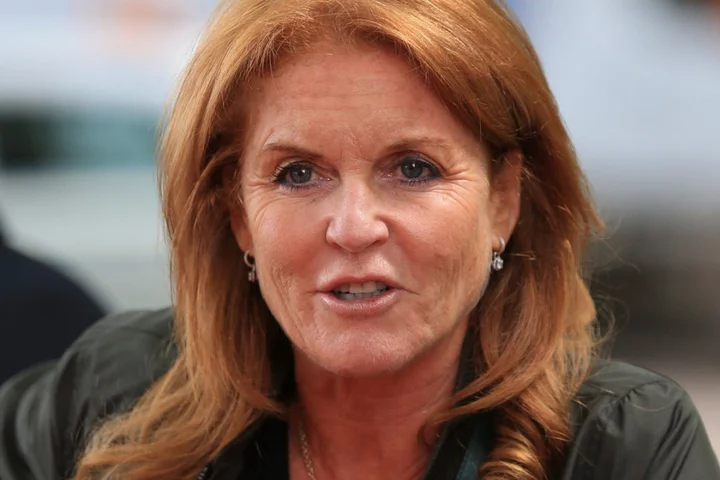
Duchess of York to make Loose Women debut for breast cancer awareness campaign
The Duchess of York will make her debut on ITV’s Loose Women to launch a breast cancer awareness campaign following her treatment for the illness earlier this year. Sarah Ferguson underwent an eight-hour single mastectomy operation after discovering she had an early form of breast cancer during a routine mammogram. The special episode, billed as Ferguson’s first TV appearance since revealing her diagnosis, will launch its “Don’t Skip Your Screening” campaign to highlight the importance of being checked for cancer. The duchess will join presenters Christine Lampard, Coleen Nolan and Brenda Edwards on the show’s panel to discuss the campaign and her own experiences since being diagnosed with breast cancer. Ahead of the show on Thursday (2 November), Ferguson revealed she nearly skipped the screening appointment “that saved my life” adding that her cancer journey “underlines the importance of getting screened” regularly. “I couldn’t face a journey into London on a hot day this summer and it was only my sister Jane’s insistence that I went, that persuaded me,” the mother-of-two said. “My cancer was completely symptom-free – I never found a lump and did not feel ill.” Doctors noticed a “shadow” in one of her breasts during the screening in May, which was later diagnosed as cancer. Ferguson added that she is “proud” to support the campaign, which is being backed by NHS England, to encourage other women to attend the appointments when they are invited. In July, Ferguson confirmed she underwent an eight-hour-long single mastectomy, adding that the diagnosis was “scary” for her daughters, Princesses Beatrice and Eugenie, during an episode of her podcast Tea Talks. She said: “I think it’s scary for any family member out there, you really start looking at your own demise. It’s a wake up call, and you think, right okay, how am I going to deal with this?” Ferguson also advised her listeners to “do the screening, catch it quick”, while thanking the medical professionals at King Edward VII’s Hospital in London for their care and treatment. Earlier this year, Ferguson also explained how the mastectomy helped her overcome the “self-hatred that stemmed from years of being compared to Diana. During a separate episode of her podcast, Ferguson suggested she had to have a “body part cut off” before she could “wake up”. She told her co-host, Sarah Thompson: “Not because of seeing death, but waking up to stop worrying, stop self-hatred, stop self-doubt, stop all these things. Stop not liking yourself, really, please, honestly. “Does it take that?... Yes, it did in my case,” Ferguson continued. “[I] didn’t like myself and that was because I think I was always compared to Diana and I think at the end I sort of believed my own press which is not too good.” Charity Breast Cancer Now said it is “extremely grateful” that the show is “shining a bright spotlight on breast screening” and “highlighting the important issue of tackling the shortfall in women having breast screening caused by the Covid-19 pandemic”. In a statement, it added: “Breast screening is a vital tool in helping to detect breast cancer at the earliest possible stage, when treatment is more likely to be successful. “We encourage all women to attend breast screening appointments when invited and to regularly check their breasts, reporting any unusual changes to their GP as soon as possible.” The duchess will join the panel on Loose Women on 2 November from 12:30pm on ITV1 and ITVX. Read More Sarah Ferguson shares heartfelt tribute to Matthew Perry following his death Doctor highlights most commonly misdiagnosed health conditions in women Mom explains how to ‘raise your baby like it’s your third’ Doctor highlights most commonly misdiagnosed health conditions in women Mom explains how to ‘raise your baby like it’s your third’ ‘It was terrifying’: All the things Jada Smith Pinkett has said about her alopecia
2023-11-02 00:17
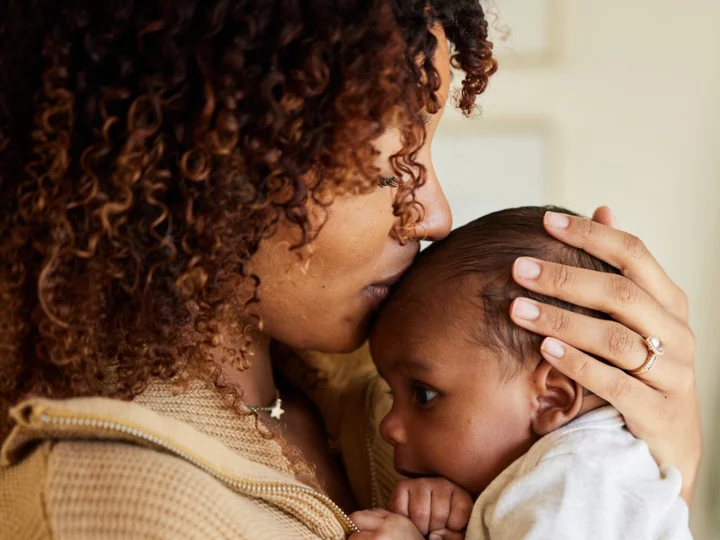
Mom explains how to ‘raise your baby like it’s your third’
One mom is exposing her secrets for first-time parents. In an interview with Today, mother of three Caroline Chambers opened up about the difficulties she endured with her first-born child. Although it’s very normal for mothers to experience certain symptoms related to postpartum, Chambers’ year of anxiety after delivery felt particularly difficult. “The first year of my child’s life was plagued with so much anxiety and fear,” she said. “Of course, I was obsessed with him and had so many amazing moments of just loving it, but there was also just a lot of fear around the unknown.” Despite the cookbook author’s prior struggles, she was still keen to grow her family. By the time her second child, Callum, was born, she’d gained a new perspective on being a parent. “None of it matters. They’re going to sleep eventually. None of it is actually a pattern. You can’t actually diagnose it. You can’t actually Google your way into better sleep. It just takes time,” she recalled to the outlet. Chambers is a mother to three sons: Mattis, five, Callum, three, and Cashel, one. While feeding schedules and nap times for her son Mattis were overwhelming and stress-inducing, Callum’s care was a “more joyful” experience for her, having already known what works and what doesn’t for newborns. The intuitive mother recognised that both parenthood and being a mother is “terrifying the first time because you don’t know what to expect”. Still, she explained that welcoming more children into her life helped her learn that babies aren’t the “precious little fragile creatures that we think they are.” Chambers took to her Instagram account last April, revealing her tips for raising your first child like your third. First, she suggested taking opportunities to “leave your baby”. Chambers emphasised the importance of taking time for yourself and allowing babysitters to take over for a few hours, so you can either go on a solo date or enjoy time with your partner. “Your husband isn’t the enemy. The baby is the enemy,” Chambers jokingly wrote. For her next tip, she said that “this too shall pass.” According to Chambers, each phase for a baby is fleeting, lasting around “two weeks and it’s on to the next thing”. Chambers also told her followers not to leave the house chores for when your baby asleep. Not only will this feel like you’re being overworked without any breaks, but Chambers pointed out how babies don’t mind watching you vacuum or do the dishes. “Put on your oxygen mask first,” she continued. “You can’t take care of your baby if you can’t take care of yourself. Take a shower. Eat delicious meals with lots of greens and protein. If you feel sad, call your OB and tell her about those feelings... Get a blowout. Go get lunch or dinner by yourself.” Lastly, Chambers urged mothers not to fall victim to the “four Bs of a bedtime routine” and maintained that following the sequence of “bath, boob/bottle, book, bed” isn’t necessary. “As long as the baby is fed and in bed, they will not care how you get them there. Dunked in the bath once a week, they are FINE,” she wrote. Many thankful mothers chimed in, adding their own advice and experience after Chambers encouraged them to do so in her caption. “Love this!!!!! We bathe our baby one to two times a week. MAX. I’d also add: the whole eat, play sleep order is BS! Don’t stress about it. Feed when they need it. Love following you & learning mama,” one mother noted. Another commented: “For the toddler phase: Tell them, ‘I’m going to close my eyes and when I open them, I’ll see… (insert whatever you’re trying to get them to do)”. This ALWAYS works for my kiddo when I need him to put on his clothes, go to the bathroom, etc. It’s magic!” The Independent has reached out to Chambers for a comment. Read More People rally around mother who explained why she ‘hates being a mom sometimes’ Princess Eugenie apologises as she makes motherhood confession ‘It was terrifying’: All the things Jada Smith Pinkett has said about her alopecia ‘It was terrifying’: All the things Jada Smith Pinkett has said about her alopecia Scientists say we’ve all been using sunscreen wrong in new cancer warning If being without your phone fills you with dread, you could have nomophobia
2023-11-01 01:22
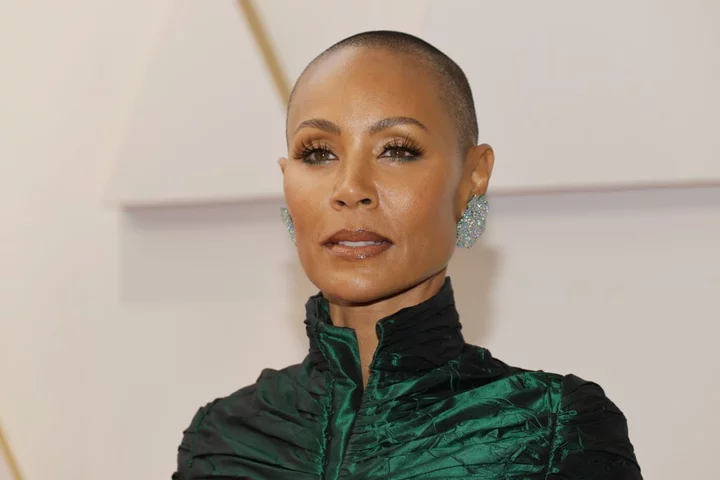
‘It was terrifying’: All the things Jada Smith Pinkett has said about her alopecia
Viewers of Sunday evening’s Oscars ceremony were astonished to watch Will Smith strike comedian Chris Rock after he made a joke at the expense of his wife, Jada Pinkett Smith. Rock was presenting the award for Best Documentary when he made a joke about Pinkett Smith’s appearance. “Jada, I love you. GI Jane 2, can’t wait to see you,” he quipped in an apparent reference to the actor’s shaved head. The Red Table Talk host, who has spoken candidly about her hair loss from alopecia in the past, was seen rolling her eyes at the comment. Will then walked onstage and struck the comedian, yelling “keep my wife’s name out your f***ing mouth”. The 50-year-old actor first revealed that she had alopecia in 2018, describing the sudden hair loss she experienced as “terrifying”. Speaking to her mother Adrienne and daughter Willow on an episode of Red Table Talk, the actress recalled losing “handfuls of hair” in the shower one day. She then explained how her condition prompted her to cut all her hair off. “I’ve been getting lots of questions about why I’ve been wearing this turban,” she said. “Well, I’ve been having issues with hair loss. “And I’ll tell you it was terrifying when it first started. I was in the shower one day and then just handfuls of hair, just in my hands, and I was like ‘oh my God am I going bald?’ “It was one of those times in my life when I was literally shaking with fear.” The Girls Trip star added that maintaining a sense of perspective has helped her cope. “People are out here with cancer, with sick children… I watch the higher power take things every day and if the higher power wants to take my hair? That’s it? God, you want my hair? “When I looked at it from that perspective it did settle me.” She went on to credit turbans for helping her feel empowered as a result of her hair loss. “When my hair is wrapped, I feel like a queen,” she said. In July 2021, fans praised Pinkett Smith after she debuted a new buzz cut, saying it was “time to let go” after her struggle with hair loss. The actor posted about the new style on her own Instagram, where she uploaded a short video of herself posing against a backdrop of flowers and revealed that her daughter had been the one to encourage her to cut off her hair. “Willow made me do it because it was time to let go BUT … my 50s are bout to be Divinely lit with this shed,” the 49-year-old captioned the video. And in December, the Matrix Resurrections actor shared a video to Instagram during which she pointed out a line on her scalp that had developed as a consequence of the condition. “Now at this point, I can only laugh,” she said at the start of the video. “Y’all know I’ve been struggling with alopecia and just all of a sudden one day, look at this line right here. Look at that,” she said. “So it just showed up like that and this is going to be a little bit more difficult for me to hide.” “So I thought I’d just share it so y’all are not asking any questions,” Pinkett Smith added. She joked: “But you know mama’s going to put some rhinestones in there. I’m going to make me a little crown,” she said. “That’s what mama’s going to do.” Pinkett Smith previously revealed that the cause of her own alopecia had not been identified by doctors, but that she believed it may be stress-related. According to the NHS, hair loss, known medically as alopecia, is fairly common. It's estimated that around 40 per cent of women aged 70 years or over experience female-pattern baldness – the most common type of hair loss, which is thought to be inherited. Hair loss can be genetic, or as a result of extreme stress, a medical condition or treatment. It's also common for women to lose more hair than usual up to three months after they've given birth. Read More ‘It was terrifying’: All the things Jada Smith Pinkett has said about her alopecia Will Smith issues ‘official statement’ on Jada Pinkett Smith marriage Will Smith releases bizarre ‘official statement’ video after marriage revelation Will Smith speaks to crowd about relationship with Jada Pinkett Smith Jada Pinkett Smith built ‘love nest’ for her and Will Smith to spend alone time Jada Pinkett Smith reveals why she and Will Smith never signed a prenup
2023-10-31 05:54
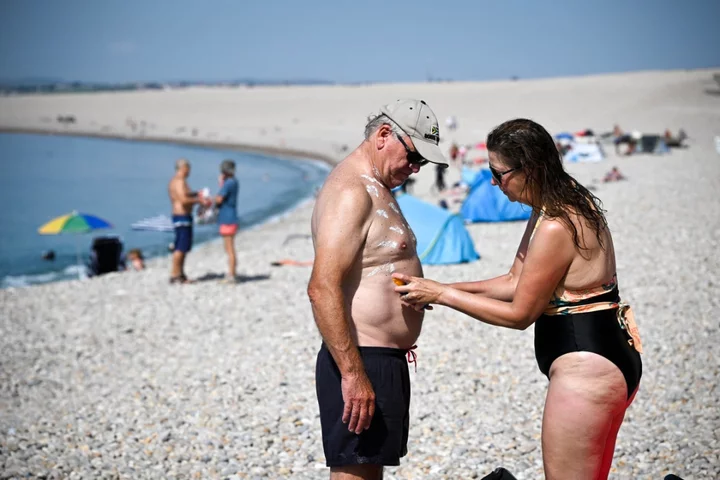
Scientists say we’ve all been using sunscreen wrong in new skin cancer warning
Most people do not apply enough sunscreen or wear adequate clothing when out in the sun for too long, according to a new study that warned that the product may be giving them “a false sense of security”. The research, published recently in the journal Cancers, sheds more light on the observation that melanoma and skin cancer rates are rising globally despite a rise in sunscreen usage – an oddity termed the “sunscreen paradox”. “The problem is that people use sunscreen as a ‘permission slip’ to tan. People think they are protected from skin cancer because they are using a product marketed to prevent a condition,” study co-author Ivan Litvinov from McGill University in Canada said. In the research, scientists found that Canadians living in provinces with incidence rates for melanoma – one of the most aggressive forms of skin cancer – were more likely to report using sun protection, more aware of the health risks of sun exposure, and more apt to follow the UV index. Overall, scientists assessed data from 22 focus groups encompassing 95 Atlantic Canada residents. The analysis found that despite reporting more awareness and intent for protection from the sun, people in these provinces received more sun exposure due to warmer temperatures and a tendency to engage in outdoor activities. In another assessment of people in the UK, they found contradicting evidence that sunscreen use was surprisingly linked to an over two-fold risk of developing skin cancer. “These combined findings suggest a sunscreen paradox, whereby individuals with higher levels of sun exposure also tend to use more but not an adequate quantity of sunscreen or other sun-protection measures, providing a false sense of security,” Dr Litvinov explained. Scientists call for new interventions, considering this sunscreen paradox, to address knowledge gaps in sun protection and skin cancer prevention. “Sunscreen is important, but it is also the least effective way to protect your skin when compared to sun protective clothing, rash guards, and sun avoidance. People can and should enjoy the outdoors, but without getting a sunburn or a suntan,” Dr Litvinov added. Read More If being without your phone fills you with dread, you could have nomophobia When do the clocks go back in the UK this year? Nursery places and wraparound childcare plans announced
2023-10-30 13:48

If being without your phone fills you with dread, you could have nomophobia
If you’re filled with terror at the prospect of being without your phone, you’re not alone. A new poll has found that 42% of British adults identify with ‘nomophobia’ – the fear of being stuck without mobile phone connectivity. According to psychologist Dr Linda Papadopoulos, nomophobia is firstly about “dependency”, and secondly about “slight catastrophising”. She said: “The key to having a healthier relationship with your phone is implementing values, boundaries and being self-aware when it comes to how we use our phones.” Of the 2,000 people surveyed by Sky Mobile, 23% said they would rather hold a tarantula, 14% said they would prefer to go swimming with sharks, and 15% said sleeping in a haunted house would be better than being without 5G for an entire week. According to the research, on average British people use their phone for 14 hours per week. Here’s what you need to know about phone addiction – and how it might be impacting our wellbeing… How can we spot the signs of nomophobia or phone addiction? According to Papadopoulos, it’s quite simple. “If you’re engaging and constantly checking to see where your phone is or if you’ve missed a call, [and are] worried, anxious about the possibility of missing out” – whether this is a social event or something work-related – you could have nomophobia, Papadopoulos suggested. “We’re at our most peaceful when we feel like we have control over something.” She encourages you to think about the first thing you look for when you wake up or walk out the door – if it’s your phone, it could be a sign of nomophobia. “There’s also this thing where we think our phone is vibrating, and it’s not. That’s another sign too.” Has social media made it worse? It’s important to understand what our phones are to us. “They’re no longer just phones, right? They are these digital prostheses, which we use to do everything from learn to work to connect,” said Papadopoulos. “In the case of things like social media, we know that a big part of our desire to be on those apps is around that sense of not just belonging – which obviously they were originally intended for – but also that sense of missing out. “So I think anything that you do, which relates to who you are, your expectations around your work, your personal life, are all going to feed into this.” How might it be impacting our wellbeing? “It all depends on what we are doing with our phones. If I’m sitting down doom scrolling, of course it will affect how I’m feeling. That’s not great,” she suggested. “You want to own your technology instead of your technology owning you. Don’t catastrophise your mobile phones, because there are other things you can do to remain connected and it can lead to technology separation anxiety – the disproportionate sense of fear of being without your technology. “When you are talking about any sort of addiction, if it gets in the way of your day-to-day life, you start having disproportionate reactions, struggle to engage with people in real life, your sleeping pattern is non-existent or not eating your dinner, those are the sorts of things you should look out for when it comes to nomophobia. “For example, if a 12-year-old girl is posting a bunch of things on social media and sitting at her phone waiting for likes, that would be a sign of her phone affecting her mental health.” But there are also positives to mobile phones, Papadopoulos adds. “I live really far away from my family. Sometimes I even cook with my mum, even though she lives in Cyprus,” she said. How can we start to address it if we think we have a problem? “Do basic things like keeping your phone in the same place to avoid using brain power constantly looking for where it is,” Papadopoulos advised. “And don’t vilify or deify your mobile phone. It’s neither the best thing in your life or the worst. This will help you start to get a sense of control over those anxious thoughts.” If you’re concerned that your behaviour might be addictive, see your GP for help. For more information on how to switch to Sky Mobile visit https://www.sky.com/shop/mobile. Read More Nursery places and wraparound childcare plans announced Is scalp exfoliation the key to healthier hair? Why do some people love horror movies? TikTok influencers warn about ‘potent’ steroid cream risks among black women – dermatologist explains the risks House of the Year 2023 shortlist revealed by Royal Institute of British Architects Fatima Whitbread supporting new fostering campaign, as research finds ‘misconceptions put people off’
2023-10-27 16:59
